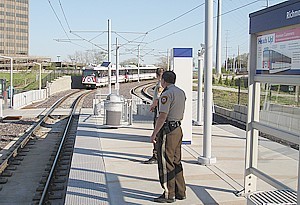 As the regional transit advocacy organization representing more than 20,000 constituents, including riders, major employers, academic institutions, labor and community organizations, Citizens for Modern Transit (CMT) is, and will continue to be, committed to advocating for a safe, secure, high-quality transit system for current and future riders. Ridership on the public transit system has declined more than 10 percent over the past several years. While fuel costs and economic activity are among the contributing factors associated with the negative ridership trend, the most troubling problem involves public confidence in the system. Public perception and faith in the system’s safety has been seriously eroded following several tragic incidents, lack of accountability, and a security plan that has proven ineffective over the past 20 months.
As the regional transit advocacy organization representing more than 20,000 constituents, including riders, major employers, academic institutions, labor and community organizations, Citizens for Modern Transit (CMT) is, and will continue to be, committed to advocating for a safe, secure, high-quality transit system for current and future riders. Ridership on the public transit system has declined more than 10 percent over the past several years. While fuel costs and economic activity are among the contributing factors associated with the negative ridership trend, the most troubling problem involves public confidence in the system. Public perception and faith in the system’s safety has been seriously eroded following several tragic incidents, lack of accountability, and a security plan that has proven ineffective over the past 20 months.
In May, St. Louis City Mayor Lyda Krewson, St. Clair County Board Chairman Mark Kern, and St. Louis County Executive Steve Stenger, whose jurisdictions fund Bi-State Development, in addition to John Nations, CEO of Bi-State, signed a Memorandum of Understanding (MOU) outlining the plan to improve MetroLink security developed in cooperation with law enforcement. The MOU demonstrates unprecedented collaboration on the part of St. Louis City, St. Louis County, St. Clair County and Bi-State.
“Among the solutions aimed at safety and security improvements on MetroLink that are outlined in the regional Memorandum of Understanding (MOU) is the establishment of a new Transit Advisory Working Group. Citizens for Modern Transit (CMT) was asked to serve on this group, and in this role we continue to advocate for the immediate implementation of measures to improve safety and security, and over the longer term, the development of a regional plan to rebuild transit ridership,” said Kimberly Cella, executive director of CMT.
The Transit Advisory Working Group, representing thousands of riders, drivers, and regional stakeholders, is committed to advocating for a safe, secure, high-quality transit system. The MOU lays out a plan and action steps for all law enforcement and public safety stakeholders to work in tandem to ensure the St. Louis transit system is safe for all users. The Working Group believes the cooperation of all stakeholders involved is critical to the continued success of the regional transit system.
Objectives of the Transit Working Group:
- Ensure all stakeholders fully implement the Memorandum of Understanding and related practices and procedures in a cooperative manner to improve public safety on the MetroLink system.
- Support establishment of the MOU’s multi-jurisdictional task force with officers from St. Louis County, the City of St. Louis, and St. Clair County.
- Shift operational control of law enforcement and public safety on MetroLink to the multi-jurisdictional task force. This change in the command structure is critical to improve safety, restore public confidence and create the secure ridership experience that should be the hallmark of the St. Louis system.
- Create an accountable law enforcement plan for all levels of security.
There has been an increase in the number of law enforcement officers on the system in both Missouri and Illinois, and CMT is now advocating for and is poised to assist with the development of immediate safety and security improvements in tandem with other members of the Working Group, as well as a longer-term strategy for improving ridership on the system and developing a regional plan for future expansion. Specifically, CMT is calling for the:
- Delineation of the responsibilities for each level of public safety, including sworn peace officers from the three jurisdictions, Metro corporate security guards and contract security guards and education of MetroLink riders on the role of each level of security.
- Securing a multi-jurisdictional command center for the MetroLink security unit on the alignment to coordinate efforts and ongoing communication.
- Creating opportunities for engagement between law enforcement and riders/drivers on the system to build trust and confidence in system.
- Completing an environmental design/security audit as expediently as possible. There is no recent data in this market on the best approach to improve access control on the system. This study can lay the groundwork for determining the best technology, including reviewing turnstile options and pricing moving forward.
- Implementing environmental design changes at the stations that may impact perceptions of safety and security, including lighting, maintenance, signage, etc.
- Implementing a pilot access control program at several stations.
- Developing an exclusion policy for riders who have committed Part 1 crimes on the system.
“There is no single answer to the safety and security issues impacting the transit system. Agreement by the City, County, St. Clair County and Bi-State to tackle those issues jointly is an unprecedented show of regional collaboration that will benefit not only transit riders, but the entire region. The next step now must be a coordinated effort on the part of these elected officials and their law enforcement agencies to work with Bi-State Development and other key stakeholders to help ensure all riders, whether daily commuters or recreational riders, have confidence that they will have a safe and secure ride,” said Cella.
As CMT members, we ask you to reach out to your local elected officials and let them know you support their efforts on MetroLink safety.